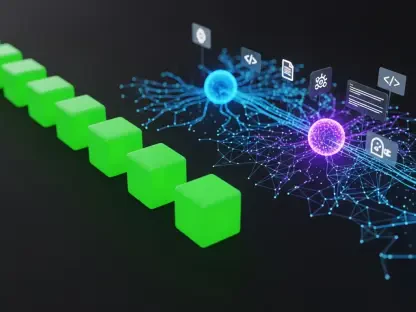Understanding the Role of AI in DevOps Today
The landscape of software development is undergoing a profound transformation as artificial intelligence coding tools gain traction in DevOps environments. These tools, designed to automate and enhance various aspects of application development, are redefining how teams approach coding, testing, and deployment. Their integration into daily workflows signals a shift in traditional practices, pushing organizations to rethink developer roles and operational strategies. This change is driven by the promise of efficiency and innovation, positioning AI as a critical component in modern DevOps.
A recent survey conducted by Enterprise Management Associates on behalf of Perforce, involving 206 IT leaders and executives, reveals the extent of this adoption. The findings indicate a significant uptake among developers and decision-makers, with many incorporating AI tools into their pipelines to streamline processes. This widespread acceptance underscores the technology’s perceived value, though it also highlights varying levels of maturity in implementation across different organizations. The data suggests that AI is no longer a novelty but a strategic asset for many in the industry.
Key players in the AI coding tool market, including prominent platforms and emerging vendors, are shaping this evolving space with innovative solutions. Their offerings range from code generation to automated testing, catering to diverse needs within DevOps teams. The significance of these tools lies in their ability to address longstanding challenges in software development, such as speed and quality, while also introducing new dynamics that organizations must navigate carefully. As adoption grows, understanding the full impact of AI on DevOps remains essential for staying competitive.
Benefits of AI Coding Tools in DevOps Workflows
Key Advantages Driving Adoption
The appeal of AI coding tools in DevOps is evident from the substantial benefits reported by survey respondents. A notable 62% of participants highlighted higher developer satisfaction as a primary advantage, reflecting how these tools can improve morale and engagement. Additionally, 49% pointed to faster time to market, a critical factor in today’s fast-paced digital economy, while 43% noted improved onboarding for junior developers, easing the learning curve for new team members.
Beyond these core benefits, AI tools contribute to operational excellence in several ways. Enhanced test coverage, cited by 56% of respondents, ensures more robust applications, while consistent code formatting, noted by 55%, promotes maintainability across projects. Furthermore, 38% of those surveyed appreciated the reduction of repetitive tasks, freeing up developers to focus on more strategic work. These advantages collectively demonstrate why AI is becoming a cornerstone of efficient DevOps practices.
Impact on Productivity and Pipeline Efficiency
Productivity gains are another compelling reason for the adoption of AI tools, with 38% of respondents acknowledging improvements in this area. Tools such as AI coding platforms are particularly valued for lowering barriers for new developers, as reported by 33%, enabling less experienced staff to contribute effectively. This democratization of coding capabilities can accelerate team output and foster a more inclusive work environment within DevOps settings.
Organizations are also leveraging specific metrics to justify their investments in AI technologies. A significant 70% focus on code quality and defect reduction as key indicators of success, while 62% prioritize developer productivity as a measurable outcome. These metrics not only validate the financial commitment to AI but also provide a framework for assessing long-term value, ensuring that the tools align with broader business goals and pipeline efficiency objectives.
Challenges and Risks of AI Integration in DevOps
The integration of AI into DevOps is not without its hurdles, as the survey reveals several pressing concerns. Security and privacy risks top the list, with 62% of respondents identifying these as major issues when deploying AI coding tools. Another 52% worry about the introduction of vulnerabilities and defects, which can undermine application integrity, while 61% express apprehension over an overreliance on AI outputs, potentially leading to diminished critical thinking among developers.
Workflow disruptions also pose significant challenges, with 57% of participants reporting negative or neutral impacts due to inconsistent code quality and unpredictable testing outcomes. Such inconsistencies can slow down development cycles and erode trust in AI-generated results. This highlights a critical need for better alignment between AI capabilities and existing DevOps processes to minimize friction and ensure smoother integration.
Specific tools like AI coding platforms face their own set of obstacles, with 54% of users citing poor code quality as a persistent problem. Additionally, 48% note an overreliance on inexperienced staff, which can exacerbate errors, and 45% struggle with integration issues within DevOps pipelines. These challenges underscore the importance of tailored solutions and robust training to mitigate risks associated with AI adoption in complex development environments.
Security and Compliance Concerns in AI Adoption
Security remains a paramount concern in the adoption of AI coding tools, with 45% of survey respondents citing it as a primary reason for restricting the use of non-approved tools. The fear of data breaches and unauthorized access to sensitive information drives this caution, prompting organizations to enforce strict policies. This protective stance is crucial in safeguarding proprietary systems and maintaining trust in digital operations.
Compliance issues further complicate the landscape, as 32% of participants highlight intellectual property protection as a key worry when using AI tools. Another 25% point to vendor conflicts, which can create legal and operational dilemmas. These concerns necessitate a comprehensive approach to governance, ensuring that AI implementations adhere to regulatory standards and organizational guidelines without compromising innovation.
Addressing these security and compliance challenges requires rigorous oversight and validation mechanisms. Organizations must invest in processes that scrutinize AI outputs for potential flaws and ensure alignment with established protocols. By prioritizing such measures, DevOps teams can mitigate risks and foster a secure environment for leveraging AI, balancing the drive for efficiency with the imperative of safeguarding critical assets.
The Future of AI in DevOps: Opportunities and Uncertainties
Looking ahead, the potential for AI coding tools to evolve offers exciting possibilities for DevOps teams. Survey respondents identified key areas for improvement, including real-time vulnerability detection, favored by 55%, and automated test generation, supported by 53%. Enhanced pipeline orchestration, noted by 46%, also ranks high as a desired advancement, promising to streamline complex workflows and boost operational resilience.
Despite this optimism, a noticeable gap exists in re-engineering DevOps workflows to fully accommodate AI. Many organizations have yet to adapt their processes, leading to inefficiencies and missed opportunities. This cautious approach reflects a broader uncertainty about how deeply AI should be integrated, with teams weighing the benefits of automation against the need for human oversight and control in critical development stages.
Broader industry trends suggest that balancing innovation with risk will remain a central theme in AI’s role within DevOps. Emerging technologies and shifting organizational priorities are likely to influence adoption patterns over the coming years, from 2025 onward. As AI capabilities mature, the focus will likely shift toward creating adaptive frameworks that harness its potential while addressing inherent uncertainties, ensuring sustainable progress in software development.
Conclusion: Balancing Innovation and Risk in AI-Driven DevOps
Reflecting on the insights gathered, it is clear that AI coding tools have emerged as both a powerful asset and a complex challenge for DevOps environments. The survey findings highlight a notable shift in developer roles toward review and validation tasks, driven by the necessity to manage AI limitations. Security stands out as the foremost concern, often overshadowing the efficiency and onboarding benefits that many acknowledge.
Moving forward, organizations are encouraged to adopt a strategic approach by investing in robust validation processes and comprehensive training programs to address quality and dependency issues. Establishing clear governance frameworks is seen as vital to navigating security and compliance risks effectively. By prioritizing these steps, teams can harness AI’s transformative potential while mitigating pitfalls, paving the way for sustainable growth in software development.









